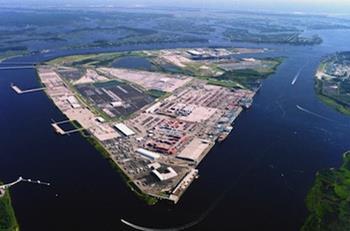The impact of Hurricane Milton, which landed as a Category 3 storm on the Florida coastline late Wednesday (October 9), is still being assessed for its impact on container and finished vehicle logistics in the affected region.
Ports providing finished vehicles services closed on October 9 as a precaution. The port of Jacksonville (Jaxport) was closed as of noon through to October 10 with the main gates planned to reopen on October 11, pending the successful completion of facility assessments. The port is now fully operational again. Port Tampa Bay also closed vessel traffic and only continued landside operations as long as safely possible.

The US Coast Guard set port condition Zulu for each port meaning vessel movements had to be stopped but that landside fuel operations could continue. Power supply is currently an issue for some ports affecting the extent to which operations can restart. Port authorities are working with the US Army Corps of Engineers, US Coast Guard and maritime partners to to assess landside and oceanside operations.
Port Tampa Bay said it is working with its fuel terminal operators to assess their facilities and learn when they will be able to return to service. “Our port fuel terminal partners have fuel ready to deploy to our region, but many remain without power. We are hopeful the fuel terminals can be re-established today and are working with our energy supplier, TECO, to expedite the process,” read a statement from Port Tampa Bay.
Toyota at Jaxport
Toyota North America said it was still assessing operations at the ports. The carmaker exports vehicles from the Tallyrand and Blount Island terminals at Jaxport. A spokesperson for the Toyota North America said on October 10 there was no known impact at the port at that time. Southeast Toyota Distributors vehicle distribution centre in Florida is located in Deerfield Beach, near Fort Lauderdale, south of the trajectory that Hurricane Milton took through Florida and was unaffected, according to Toyota’s spokesperson. Toyota also confirmed that certain dealers had taken precautions ahead of time, including securing vehicles indoors or in nearby facilities.
One of Jaxport’s finished vehicle terminal operators, Amports, reported that landside and oceanside operations were reopened on Friday (October 11), and business has returned to normal. The company said it had taken precautionary measures to safeguard vehicles and equipment, including relocating vehicles from flood-prone areas and securing objects that could become hazardous debris.
“During weather events, the safety of our team is our top priority, and we make decisions in alignment with Jaxport and the US Coast Guard Captain of the Port,” said a spokesperson for Amports.
Fallout from Helene
While Milton was expected to have a more devastating impact than the very recent Hurricane Helene, which also took its toll on Florida, the impact on the automotive supply chain of Milton does not appear to have been as severe as Helene and so far no reports of inbound supply chain issues have been confirmed.
The trajectory of Hurricane Helene, which landed on the Florida coastline on September 26, moved through on from Florida as a storm through Georgia, South Carolina, North Carolina, Virginia and Tennessee. It affected parts suppliers in the region meaning that OEMs lost several days of production. GM was forced to close its Arlington (Texas) and Flint (Michigan) assembly plants because of supply chain issues. VW was also forced to suspend production at its Chattanooga plant (Tennessee) because of a parts supply problem caused by the storm.
Quartz mining in North Carolina’s New Spruce Pine region was also affected by Helene, threatening a supply shortage to the semiconductor industry, according to a number of sources. CNN reported that the mines, managed by Sibelco and The Quartz Corp, stopped operations on September 26. Sibelco was able to restart operations on October 11 but there has been no announcement of a restart at The Quartz Corp’s operations.
Last week The Quartz Corp said it had established strong levels of feed stock in Norway to supply its purification operations. “Coupled with safety stocks of finished products and those that exist at different levels throughout the supply chain, we do not anticipate any critical situation for our downstream industries in the short or medium term,” said the company.
Thanks to a temporary resolution to the ILA East Coast ports strike, there are currently no further complicating matters affecting the inbound supply of goods.
Stay posted for further updates


























![Global[1]](https://d3n5uof8vony13.cloudfront.net/Pictures/web/a/d/s/global1_726550.svgz)













No comments yet